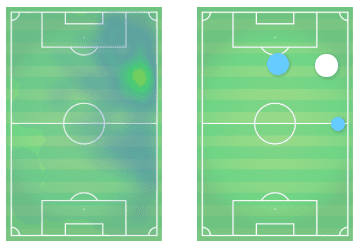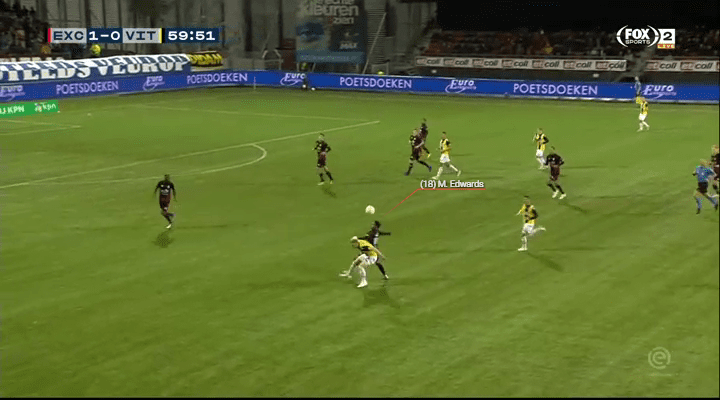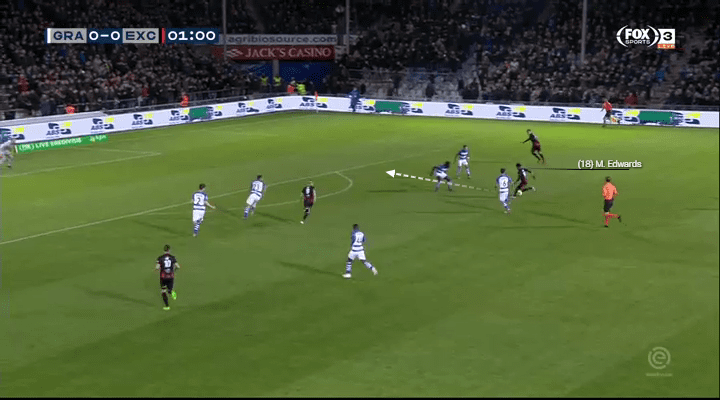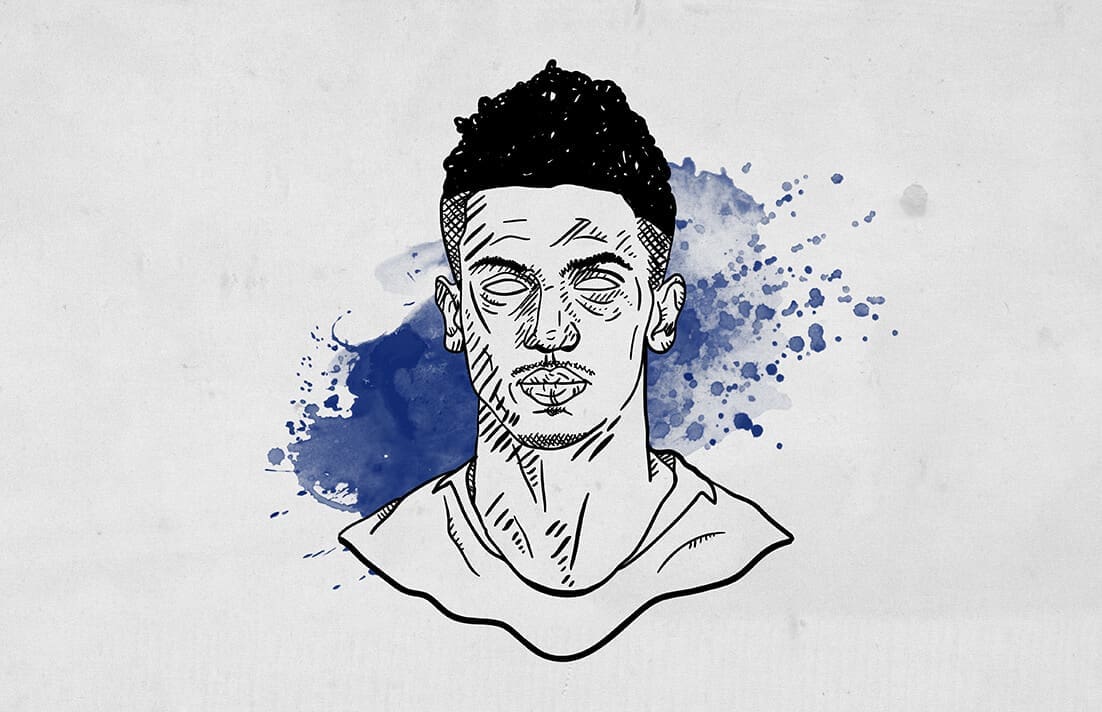The future is bright for England. They were winners at the 2017 U17 World Cup, 2017 Toulon Cup, 2017 U20 World Cup, 2017 U19 European Championship, and runners-up in the 2017 U17 Championship. However, there’s been a real surge of players furthering their careers abroad, be it on loan or a permanent transfer. Jadon Sancho at Borussia Dortmund and Reiss Nelson (the latter loan) have opted to play in the Bundesliga, for example.
The Netherlands has also been a place of choice for the country’s young starlets. With Dan Crowley of Arsenal at Willem II, Max Clark formerly of Hull City, Greg Leigh previously of Man City, and now Tottenham starlet Marcus Edwards at Excelsior. But why are all of these starlets going abroad? In this analysis, we’ll look at Marcus Edwards, what the Eredivisie can teach him, and what this could mean for England’s future.
Role at Excelsior
At Excelsior, Edwards plays as a wide playmaker, similar to Lionel Messi’s role. His instruction involves less cutting inside to shoot, like Arjen Robben, but rather finding pockets of space and exploiting them with his excellent passing and lightning-quick feet.

His effectiveness in attacking phases is promising. With 10.94 dribbles per game and 70% dribble success rate – incredibly high for a winger – as well as an impressive 81.4% pass percentage rate, Edwards is an exciting prospect for Spurs and England fans alike. His lack of defensive duties, however, is quite worrying.

As seen in the heat map above, he rarely gets back to fulfill his defensive duties. This was a recurring issue during his time at Norwich on loan last season. His temporary boss Daniel Farke openly expressed his discontent with Edwards defensive abilities.

This knack of being in the wrong place at the wrong time, at least defensively, is what’s keeping Edwards out of the Spurs first team. Spurs are renowned for their high individual workloads, attacking and defensively. Edwards is also fairly poor in the press, another key component to the modern game at any level.

His lack of aggression and overall body strength makes him almost non-existent when challenging in a shoulder-to-shoulder challenge, something he also must work on.
Lightning quick feet
Recently, England has seen a boom of players with lightning feet. With Jadon Sancho, Reiss Nelson and now Marcus Edwards all being players with bundles of flair and superb close control, England isn’t short of exciting wide men.

Here we see Edwards, despite being pressed by a number of players, managing to get past all of them – but how? With a simple body-feint and a burst of electric pace: an incredible side to Marcus’ game.

Above we see Edwards playing positive football, even when 3-0 down in the 92nd minute of the game. His quick drop of a shoulder and high levels of close-control allowed him to skip past two men and burst into the red space. This burst of pace allowed his team to attack in promising areas. Edwards’ dribbling is incredibly positive. He plays as an inside-forward, but not an orthodox one.
His aim isn’t to cut inside and score all the time, but to drop deep and overload the central areas. So even if his team is playing a 4-3-3, he drops into an advanced midfield position to numerically overload any opposition midfield. However, this often allows teams to counter-attack through the space left open on the left-wing. This has been used in Valverde’s Barcelona, with Rafinha being played in a similar mold to Edwards. Barcelona are to control the midfield and dominate possession with a numerical overload.
Off the pitch difficulties
Edwards has been described as introverted and misunderstood by many, but as cocky by others. He is an often misunderstood figure which sometimes hinders his opportunities to excel and develop.
The Telegraph revealed the news that his Norwich City loan was cut short because of ‘personal issues’. He never showed up to a single training session or team meeting on time, which angered Norwich’s senior professionals.
Pochettino himself even commented on the issue in is his book,Brave New World
.“He has authority and behavioural problems, and we have to look at the bigger picture to find out the root cause. There was a time when it would have been seen as impossible for him to play professionally, let alone make it in the Premier League.”
This statement from Pochettino is quite surprising, as he is normal shy to touch on the behaviour and social manner of his players. Perhaps he believes that Edwards would read the statement and use it as motivation to change. Later on though he questioned whether his English upbringing and the media could have inflated his ego, after he contrasted him to Messi at just 17.
“They’re from different families, backgrounds and cultures. One of them thinks like an Argentinian and the other like an Englishman. Marcus is still in the process of adapting to the rigours or being a professional, which require you to act and think differently, be disciplined and make sacrifices.”
Certainly, off-the-pitch issues are Edwards’ biggest threat to his development, as he is incredible on the ball, and potentially a massive waste of talent. So too was Ravel Morrison.
How he can improve
Daniel Farke offered a telling insight into why Edwards wasn’t playing in a public statement on Norwich’s Twitter.
“Marcus Edwards is still not where we want him with his attitude against the ball. He is improving.”
This statement certainly reiterates that Edwards has to improve mentally before he can develop as a footballer. A strong team ethic is incredibly important. N’Golo Kante, Harry Kane, and Thomas Mueller wouldn’t be half as good as they are now if they didn’t possess such incredible professionalism and a do-or-die attitude. The old phrase still stands: hard work beats talent.
As with many young starlets on big money contracts from a young age, many lack a strong team ethic. Perhaps a visit by a sports psychologist would help him understand his full potential as Charlton Athletic hot shot Lyle Taylor did successfully.
Problems at Tottenham
With top prospect Reo Griffiths leaving Spurs, and Marcus Edwards seeming to favour a move away, what’s going wrong at a club so renowned for playing youth? Griffiths, who scored four and assisted three in a 9-0 drubbing of Arsenal U18s, subsequently canceled his contract after not being included in Tottenham’s pre-season squad and has joined Lyon for free.
To some, this could be a concern. Pochettino however believes that players have to be incredible on and off the pitch. Simply scoring a few goals, or having incredible technique, does not make you a good player. Instead, he favours the mentally resilient and hard-working, with players such as Harry Winks, Oliver Skipp, and Ryan Mason being promoted by Pochettino. These three players are similar: technically good, but mentally excellent.
To summarise, the so-called hot prospects at Spurs were merely that. The lack of mental resilience and a team ethic has cost these players their place in a great academy with a manager that puts faith in youth. Instead, a new breed of mentally strong and hard-working players are seeing themselves play for the first-team.
Conclusion
Marcus Edwards has a long road ahead if he doesn’t sort his act out. He is mentally poor, but technically excellent. However, if he visits a sports psychologist, he could learn the mental side of the game more and understand what it means to play in a team. Whilst only just turned 20, he may have two or three years to improve or we could see another case of Ravel Morrison. Let’s hope for his sake, and English football’s, that he comes to terms with his difficulties. If he can realise his world-class potential, he could be something special.
If you love tactical analysis, then you’ll love the digital magazines from totalfootballanalysis.com – a guaranteed 100+ pages of pure tactical analysis covering topics from the Premier League, Serie A, La Liga, Bundesliga and many, many more. Get your copy of the FIRST of two December issues for just ₤4.99 here, or the SECOND of the December issues with an annual membership right here.





Comments